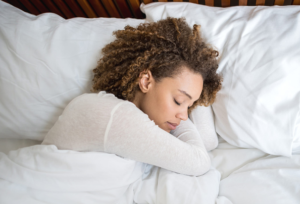 Sleep is as important to our health as eating, drinking and breathing. It provides an opportunity for our bodies to rest, restore and rejuvenate. Many important processes occur in the body and mind while we sleep. Sleep provides the rest necessary for the immune system to fight disease, and is the time when hormones are being produced to repair tissues and maintain the chemical balance in the body.
Sleep is as important to our health as eating, drinking and breathing. It provides an opportunity for our bodies to rest, restore and rejuvenate. Many important processes occur in the body and mind while we sleep. Sleep provides the rest necessary for the immune system to fight disease, and is the time when hormones are being produced to repair tissues and maintain the chemical balance in the body.
When we are sleeping, the brain is not resting. In fact, while we sleep, the brain uses almost as much energy as when we are awake to orchestrate the making of many different types of molecules — proteins, steroids, cholesterol, lipids, human growth hormone and more.
During sleep the mind also consolidates and processes memories from the day.
-
What happens if you don't get enough sleep?
Without enough sleep, you may experience the following issues:
- apathy and loss of energy
- mood problems and irritability
- impaired ability to concentration and think clearly
- impaired judgement and potential for workplace accidents
- inability to perform complex tasks in terms of speed and accuracy
- an inability to deal with stress
- higher risk of illness and physical health issues such as heart disease, high blood pressure, stroke and diabetes
- higher risk of mental health problems such as anxiety and depression.
It’s therefore easy to see why sleep is very important for good physical and mental health.
-
What is good sleep?
The amount of sleep needed is different for each person according to their age and life stage. Younger people often need more sleep, while the ability to sleep for 6-8 hours at one time may reduce as people get older. Generally, a healthy adult needs an average of 8 hours sleep a night.
Indicators that you are sleeping well include:
- Waking up feeling refreshed in the morning
- Having lots of energy during the day
- Being in a good mood
- Feeling clear-headed
-
Sleep Problems
A sleeping problem is generally described as not getting enough sleep or having poor quality sleep.
Insomnia is a sleep disorder where you may have trouble falling asleep, wake frequently throughout the night or wake up very early in the morning. As well as insomnia, some people also experience medical problems including sleep apnoea, restless leg syndrome, disturbed dreams and nightmares.
Sleep problems can happen for many reasons and bad habits aren’t always to blame. Environmental factors including noise, light or temperature can interrupt your sleep. Psycho-physiological issues such as stress, shift work disrupting the natural body clock, health problems or mental health concerns can all affect sleep.
If you experience sleep problems for a month or more, you should consult your G.P.
-
Tips to improve your sleep
Good sleep habits are often referred to as good sleep hygiene. There are many things that can be done to improve sleep.
During the day:
- Exercise regularly during the day or early evening.
- Getting out in the sunlight during the day will help you to sleep better at night.
- Keep naps under 15 minutes, and not after 3:00pm.
Before bed:
- The hour before going to bed should be used to wind down and do more relaxing things.
- Try to go to bed around the same time every night. The body’s internal clock and hormones that control sleepiness and wakefulness work best if there is a regular sleep routine.
- Avoid stimulating activities such as television, computers or smart phones.
- Avoid going to bed on a full stomach, but not hungry either.
- Avoid caffeine and stimulating drinks, try a relaxing herbal tea instead.
- Avoid smoking, especially late in the evening. Nicotine is a stimulant that can keep you awake.
- Have a hot shower or bath before bed. The rapid cool down in temperature afterwards relaxes the body and sets you up for a more restful sleep.
- Turn down the bedside clock or phone brightness, face it away from you, or remove it altogether.
- Wind down before sleep by writing down any persistent worries. Give yourself permission to put these worries aside until the morning. You could follow this up by writing down something that you are grateful for so that you are ending your day on a positive note.
- Use a relaxation technique or visualisation strategy to help you get ready for sleep, or play relaxation music.
In bed:
- Make sure the room and bed is comfortable. You want to create a dark and quiet room with a comfortable bed and a moderate room temperature, ideally between 15-18 degrees.
- Don’t watch TV, use the laptop or smartphone in bed. The bright light from the screen reduces the production of melatonin, a hormone that tells our body it’s time to sleep. Charge phones overnight outside of the bedroom.
- If you find quiet reading makes you sleepy, read for a short time but avoid reading a book you ‘can’t put down’.
- Wear earplugs if your partner snores or your environment is noisy.
- If you are not asleep after 20 minutes in bed, go to another room until you feel tired again and then go back to bed – many poor sleepers spend too long in bed trying to get to sleep.
- Evaluate your work schedule – long work hours and busy schedules are the two greatest sleep saboteurs. Consider and discuss with your manager how you may be able to adjust your schedule to improve your sleep.
Other helpful strategies:
- Try to get up at the same time each day, including weekends to help regulate your internal clock.
- Avoid trying to catch up on sleep loss by going to bed earlier or staying in bed later as this will only work against regulating your internal clock.
- Keep a sleep journal to help you track your sleeping patterns, daily habit and thoughts. This will help you to understand what might be keeping you up at night.
- Pay attention to the amount of sleep that’s best for you and don’t focus on achieving the eight-hour rule.
- If you can’t get to sleep, stop trying. Sleep is a biological process that can’t be forced. Instead focus on rest and engage in an activity to help you relax.
- Get help if you think you have a sleep disorder – go to your GP or seek out certified sleep centres and professionals certified in sleep medicine.
-
Tips for Shift Workers
Working night shifts can affect the quality of your sleep. We all have a 24-hour body clock that sets the rhythm of our sleep-wake cycle and we have been programmed to be awake during the day and asleep during the night. This programming is cued by exposure to light and dark and is called the circadian rhythm. Shift work disrupts the circadian rhythm and can lead to problems with fatigue and concentration.
On average, shift workers sleep 2 to 4 hours less than the average person.
Ways to manage and support your shift work:
- Take a nap of about 90 minutes before you go on a night shift.
- Avoid caffeine and alcohol four hours before you go to bed.
- Eat three balanced meals over the course of the day. Regular meal times can assist to cue your body to know when it is time to sleep. Avoid eating the largest meal of the day within three hours of sleep.
- Make your bedroom as comfortable and quiet as possible – use curtains to keep the bedroom dark, remove the telephone, and use earplugs if needed. A fan or “white noise” machine will help to muffle noise.
- Talk to your family about what they can do to support your sleep routine. Get their help to maximise chances of having uninterrupted sleep and avoiding noisy activities.
- Create a schedule of your shift times and sleeping times and put it up on the fridge so everyone can see it. Also include planned activities that you can do together as a family.
- If you have children, set rules around when you can be interrupted and when you can’t – be specific and give examples.
References:
Sleep Health Foundation
Bluespace Wellbeing
Mayo Clinic – Sleep Disorders
Why do we sleep anyway? – Division of Sleep Medicine – Harvard Medical School
